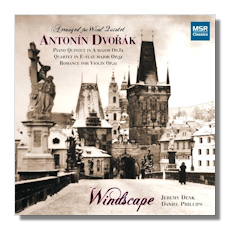
The Internet's Premier Classical Music Source
Related Links
- Dvořák Reviews
- Latest Reviews
- More Reviews
-
By Composer
-
Collections
DVD & Blu-ray
Books
Concert Reviews
Articles/Interviews
Software
Audio
Search Amazon
Recommended Links
Site News
 CD Review
CD Review
Antonín Dvořák

Arranged for Wind Quintet
- Piano Quintet in A, Op. 81 (arr. Jolly)
- Romance for Violin & Orchestra, Op. 11 (arr. Kay)
- String Quartet in E-flat, Op. 51 (arr. Jolly)
Windscape
Jeremy Denk, piano
Daniel Phillips, violin
MSR MS1175 52:29
Summary for the Busy Executive: Czech-ered.
Windscape performs in-house arrangements of three well-known chamber pieces by Dvořák. It's the rare major composer who has more than one wind quintet in his catalogue. Dvořák and Brahms have exactly none, but they did write a ton for string ensembles. Unless wind quintets do this kind of fiddling (you should pardon the expression), they find themselves barred from major parts of the chamber repertory.
You can probably tell I'm no purist when it comes to transcription. If it was good enough for Bach, it's certainly good enough for the likes of me. We should really question the worth of a specific arrangement. The translation to windspeak of the Piano Quintet for me succeeds least. In many ways, horn player David Jolly ingeniously breaks up the string parts (especially the cello line) among various winds, depending on the range and characters of the instruments. If you didn't know the original, you might indeed take this for an original. The parts suit the winds that gratefully. However, the sound of the ensemble with the piano doesn't have the gravity of the strings. This applies especially to the first movement. It sounds a lot like the pit band of a particularly small theater. It fails to transmit the Romantic expansiveness of the original. A solo wind against strings might have soared, as in the late clarinet works or the Horn Trio of Brahms. All-winds, however, bring us back to earth with a thud.
On the other hand, Alan R. Kay, the group's clarinetist, manages to capture the wildflower loveliness of Dvořák's relatively early Romance for violin and orchestra. Don't let the low opus number fool you. This is Dvořák at the beginning of his maturity. Kay's most brilliant decision was to keep the violin soloist. To some extent, this was forced on him by the high range of the part, but he could have sliced, diced, and transposed. However, his simple solution was undoubtedly the best.
For me, Jolly provides the most successful arrangement on the program, that of the String Quartet in E-flat from 1879. I don't really know why, but the quartets of Brahms and Dvořák seem to lend themselves to this kind of transcription. Samuel Baron's arrangement for winds of the Brahms String Quartet #2 may count as my favorite incarnation of that work (it may have to do with my preference of the wind performers over any string quartet I've heard so far). The liner notes posit that as Germanic composers, "idea" meant more to them than "style," or color – which, although true in individual cases, in general strikes me as malarkey. I can't think of either a more colorful piece than Dvořák's Carnival Overture or a more "intellectual" one than Debussy's Études. Here, sans piano, the winds give us the music's depths.
I complain not at all about the performers. Every one makes beautiful music, alone and together. Violinist Daniel Phillips gives an intimate, loving account of the Romance, and the winds accompany sensitively. David Jolly's first phrase in the Piano Quintet ravished me and led me to expect something more than what the transcription provided. Alan Kay contributes especially noteworthy moments throughout the String Quartet. Nothing here is badly done. On the contrary, it's superior music-making all around. Highly recommended for chamber-music enthusiasts.
Copyright © 2010, Steve Schwartz




















